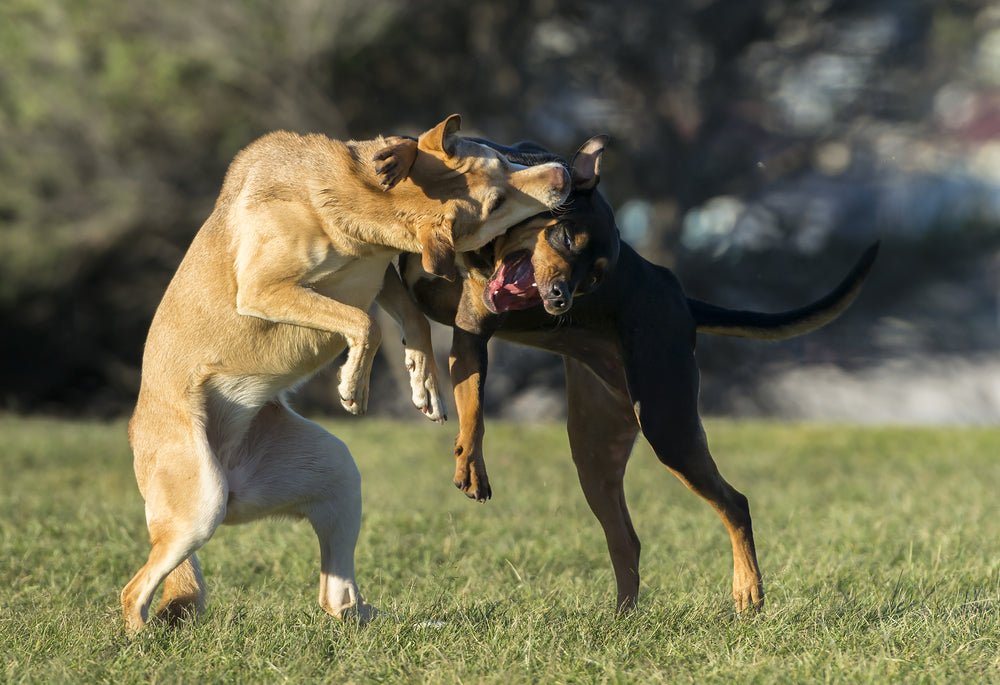Dog parks have really become a big deal. They are used daily by hundreds of families with dogs. They romp, run, play and wrestle. Sometimes, they just hang out. It often reminds me of McDonalds Play Place. Throw a bunch of random kids together and they're bound to hit it off, right? As a child, it was my favourite restaurant to eat in.
A Kid's Meal with a toy and a place to play with bouncy horses, ball pits, Merry-Go-Rounds and slides. McDonalds knew that if they built it, the kids would come - and the kids would bring their family! It was brilliant marketing on their part. The kids, after all, are typically the ones who get to choose where. The parents were happy because after eating, they got to chat while the kids played in the little windowed cell - safe and contained. What kid wouldn't love it at the Play Place? Well, there are some. The ones who get bullied by other kids. The ones who get hurt. As a kid, I remember an incident where I was pushed from behind by a child on the slide. I didn't know him. I wasn't sure if he was impatient and I was taking too long or if he truly was looking to bully me. All I know is I ended up with a goose egg on my head and a fat lip where I bit down hard. My mom came running in to help me and after attending to my immediate needs, she turned to find both child and parent had vanished. They were nowhere to be seen.
That was early on in the days when McDonalds first realized that marketing to children was beneficial. We saw exciting colours and fun and wanted to be part of it! We didn't have access to the information we do now. We made decisions based on different factors back then - the Play Place seemed safe and magical! Fast forward to today and the accessibility of details at your fingertips. Google "Play Place Accidents". I got almost 5 million results in less than one second! Now, I'm quite certain that not all 5 million results are horrific incidents, but likely, a few of them are. Now Google "Dog Park Accidents". Not quite as big a list at 1.5 million, but still a lot of incidents including Spectator articles about dogs being killed.
We don't recommend the traditional use of Dog Parks. With the lack of structure and complete anonymity, it can be a powder keg just waiting for a spark. With the stories that we are privy to, we know that it's not worth the risk. None of our staff would ever go to one. Check with any vet and I'm quite certain that they've all seen tremendous injury as a result of Leash-Free Dog Parks as well. So, the question is, are you willing to take the risk? There are, of course, a balance of facts. Probably most days go by without incident at the Dog Park. With a little planning and some rules to follow, it can be a fun experience. So, how do you decide if the risk is worth it? I would break it down to the following:
Who is Maintaining the Park?
First off, let's look at possible dangers in the environment itself. Is anyone cleaning up at the Park and watching out for debris and possible sharp objects? Broken bottles can be a giant hazard for interested dogs. Garbage such as cooked chicken bones and corn cobs can prove fatal to dogs, if swallowed. Is someone maintaining the park and making sure these dangers are removed? Of course these same dangers can be said of any park, not just the Dog Park, however at a regular park, you are likely supervising your dog completely or using your leash to keep them close.
Who is Visiting the Park?
How big is the park? How many dogs are present at any given time? For those who have small dogs, a frenzy of excitement over a small dog running loose can escalate quickly in a group of dogs. Small dogs can be hurt badly if even one dog sees them as potential prey.
Who is Monitoring the Interaction?
We ask every new client if they visit Leash-Free Parks or Doggie Daycare. The answer gives us great information about the dog coming into class. So, which answer do we prefer? Hands down, Doggie Daycare. At minimum in a reputable daycare, there is an attendant who will be well versed in canine body language. They will recognize that not all dogs are meant to be loose together and will split groups into appropriate players. They will know the dogs and when a new dog is introduced to the group, it will usually be one dog at a time. They will be able to read body language and redirect dogs at the earliest signs that something is about to go wrong. At a leash-free park, who is taking on this task? If there are 10 dogs, all belonging to people who don't know how to read body language, who is going to recognize and stop it when a fight is about to erupt?
Does My Dog Like the Park?
This is GIANT! There's a fallacy out that suggests that all dogs love playing with other dogs. This is just not true - not all dogs want to play with strange dogs. Not all dogs are comfortable and confident in a group of dogs. Not all dogs know how to play nicely. There are actually plenty of bullies out there that prey on more insecure dogs. We hear about people bringing their aggressive dogs to Leash-Free parks to have them "work it out" all of the time. Do you want your dog interacting with those dogs? Do you know how to judge if your dog enjoys the park? If your dog hangs back and hides behind you, would you leave with them or would you encourage them to go and play? The dog who hides behind you is clearly saying he's not interested in playing. Forcing the interaction can lead to disaster. It also causes your dog to lose trust in you. It only takes one incident for a dog to be very put off by other dogs and this will lead to problems in other parts of life.
Who Should Go?
If you are going to use Leash-Free Dog Parks, we recommend the following:
- Visit at times when you know the dogs who are in the park. Perhaps arrange a playgroup at specific times.
- Educate yourself on canine body language so that you can read what's truly happening
- If a new dog enters and you have any doubt about them being friendly, throw social etiquette out the window, call your dog and leave.
- Stay with your dog and watch them closely. We've all heard about the dog owner sitting in the car while their dog runs loose in the park. Not a good way to go about it at all. Be close by and don't get so distracted in conversations with others that you miss what's happening with your dog.
- Be sure you have a good recall so that you can get your dog back quickly if need be.
- Listen to your dog! If they don't want to play that day, don't force it. Listen to what they're telling you and leave. They may have an upset stomach or something may be sore. They may dislike the vibe one of the other dog's is giving off. Listen to your dog! They may not want to interact that day.
- Have a first aid kit and an emergency vet location handy so that if there is an incident, you can deal with it quickly.
In the end, it's up to you to decide whether or not to use Leash-Free Dog Parks. We hope that if you do, you will use due care and caution to keep your dogs safe from any potential harms.
As always, Happy Training!

